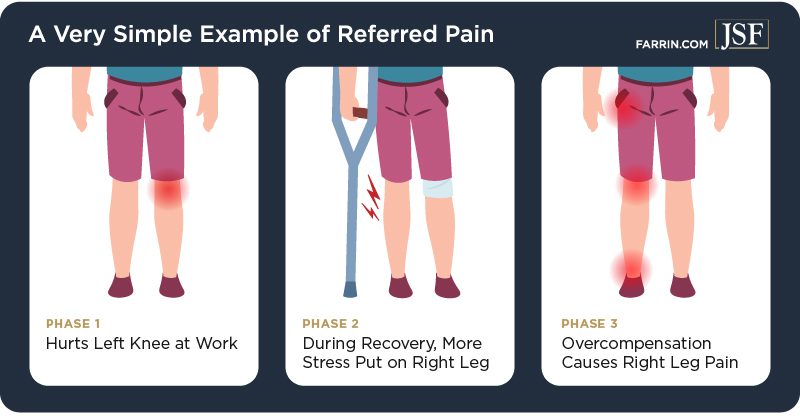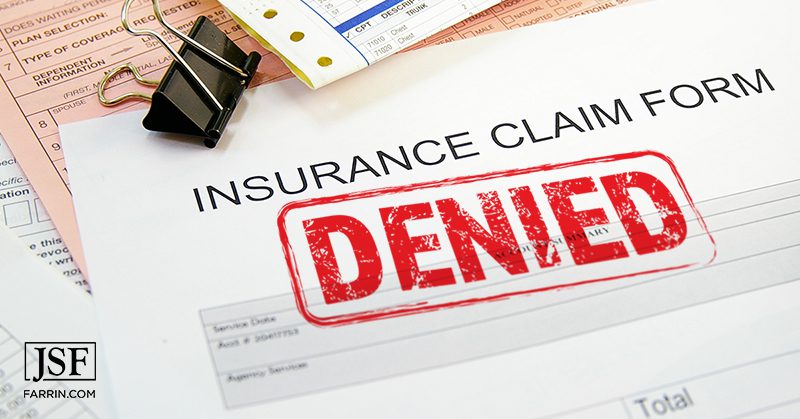“I injured my left knee at work, but now my right knee is hurting because I am putting more weight on it. Will workers’ compensation pay for treatment to my right knee?”
I guess some insurance company adjusters never learned the children’s song, “Dry Bones” … “The foot bone’s connected to the leg bone … and the leg bone’s connected to the hip bone…”
While I mention this example in jest, there’s nothing to joke about when another part of your body starts hurting after your initial workers’ compensation injury. While this can happen quite often, just as often I have found that many insurance adjusters try to refuse to pay for medical treatment for other body parts that start hurting after the initial injury. This is called “referred pain.”
What Is Referred Pain?
Referred pain refers to the pain or injury you feel in one part of your body that is actually caused by pain or injury in another part of your body. It occurs because, when you injure a part of your body, other parts must work harder to compensate. (These are also sometimes called “subsequent injuries” or “consequential injuries.”)

Common Examples of Referred Pain
Referred pain is common. For example:
-
- Joe injures his right foot. After using a cane for month or so, he starts having pain in the left hand from the pressure of leaning on the cane. Will the insurance company pay for left hand treatment?
-
- After a shoulder injury, Mary starts feeling pain in her neck which radiates down her arm. Will the insurance company pay for her to have an MRI of her neck?
-
- Martin hurts his knee at work. After a few months of limping, he starts having low back pain because of an altered gait. Is the insurance company going to pay for back treatment?
Will Workers’ Comp Pay for New Medical Issues Like Referred Pain?
In each of these instances, my experience has been that many insurance companies will do everything they can to deny new treatment. Here’s why.

The majority of insurance companies are for-profit businesses. They may try very hard to pay as little as possible in workers’ compensation benefits because this is more money they get to keep. That is why, when you report your work injury, you had better tell them about every single body part you injured.
If you fail to mention a body part at the beginning of your workers’ compensation claim, it can often be difficult to get the insurance company to pay for any medical treatment for it. Our experienced workers’ comp lawyers know this one-sided tactic, and will fight hard to try to prevent them from getting away with it. (That is why we suggest injured workers to contact us immediately after an injury. We can help you fully describe initial injuries in a way that may potentially help get other parts paid for if they stem from the work injury.)
There Is Hope Under the Law
It may be difficult to get insurance companies to pay for new medical problems that arise while your body is recovering from the initial work injury. Let’s say an infection set in after surgery from a work injury, and you had to take strong antibiotics, which resulted in severe ulcerative colitis.
However, according to workers’ compensation law, a subsequent injury or secondary injury while on workers’ comp, whether an aggravation of the original injury or a new and distinct injury, is compensable if it is the direct and natural result of a prior compensable injury.
What to Do if You Are Experiencing Referred Pain or Subsequent Injuries
In order to get the insurance company to accept responsibility for the new medical problems that crop up after a work injury, you must have medical evidence from doctors that the new problems are the direct and natural result of the work injury. But don’t think that the hand-picked workers’ comp doctor will simply agree that subsequent issues are indeed the direct result of your initial injury. I have often seen the opposite to be the case.
This is why we recommend that you seek the counsel of an experienced workers’ compensation attorney. We know what to look for, and how to approach, support, and word the claim. And we know how to fight insurance companies and the tactics they may use.
Contact NC Workers’ Comp Attorneys Soon After Your Work Injury
Err on the side of caution and contact the Law Offices of James Scott Farrin as soon as possible after your work injury. Our experienced and formidable team will fight for your right to get medical treatment, not only for your immediate work injuries, but also for all the medical conditions that you may develop as a result.
There is a lot to know about workers’ compensation law, and the system is difficult, if not nearly impossible, to navigate successfully on your own. The sooner you hire the skilled professionals at James Scott Farrin, the better we can fight to protect your rights.
Even if you don’t think you need a lawyer, contact us anyway, or call 1-866-900-7078 for a free case evaluation. Sometimes, we are able to offer simple and direct advice even if we don’t think you need a lawyer.
You May Also Be Interested In
Trying to Get Workers’ Comp Payment for Secondary Injuries or Side Effects
Workers’ Compensation Laws in (NC) North Carolina: What’s Covered
Will Workers’ Comp Pay for Additional Injuries From Overcompensation?



